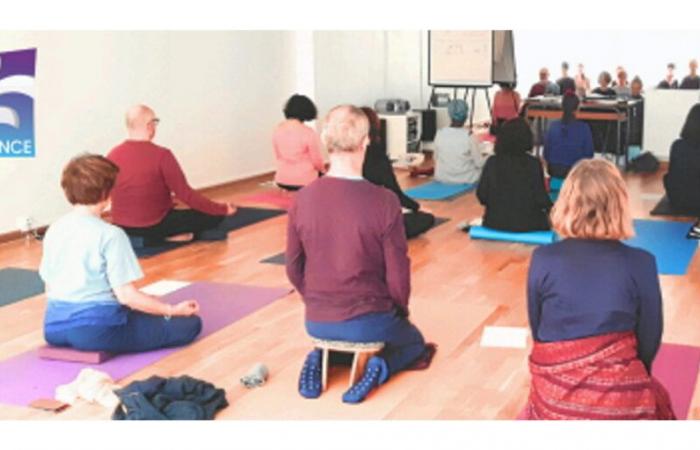
“May all beings become happy. May they be united in bliss.”, is the mantra of the association, a non-profit organization which promotes the teaching of Viniyoga. But then for beginners, what do we mean by Viniyoga? According to Martine Duchon, current president, Viniyoga “designates a traditional teaching, adapted to the needs, health and abilities of the practitioner.” A philosophy of life that echoes the principle of adaptation. The person is considered as a whole. In detail, the word Viniyoga itself can be translated as follows: “vi” in Sanskrit refers to “adaptation” while “ni” means “appropriate application”. Combined with Yoga which represents “union”, Viniyoga is therefore similar to a Tailor-made yoga, considering all aspects of being, as taught by Patañjali in the Yoga-Sūtra, the normative text of this discipline. “Viniyoga is the appropriate adaptation of the holistic tools of yoga such as āsana, prāṇāyāma, chanting, prayers and rituals, to meet the needs of individuals while respecting the differences in age, culture, religion, philosophy, profession, physique, health and emotional states that define each practitioner.”.
This teaching, accessible to all, regardless of age, physical condition or even environment, includes in fact, all types of practice, namely posture, breathing, Vedic recitation, meditation, transmission of ancestral texts, etc. The goal once again is to allow students to feel better. In this sense, Yoga and Yoga Therapy classes are initiated in a individual support logic : “Each of our teachers is able to provide an adaptation to the student without stigmatization”, says Martine Duchon. The development is done step by step, thanks to the consideration of the student as a whole. Learners practice at their own pace, according to their current possibilities. “We aim for the autonomy of the practitioner to whom we offer to experiment what is taught to them while respecting our lineage,” she adds. A value complemented by that of responsibility. Because in any transformation, it is a question of commitment and consent. To best support students, teachers and trainers ensure that each one is willing to work on themselves. “It is a real commitment”, the president confirms to us.
Training courses for all
To convey the teaching of Viniyoga, the VFF (nb: Viniyoga Fondation France), offers group classes as well as individual classes. All profiles are welcome! Elderly people, children, pregnant women, people with disabilities, everyone can participate in a group or individual class. In addition, “workshops or courses” are also offered such as meditation, Vedic chants, training in yurveda, Yoga Nidrā (relaxation), the study of traditional texts. Not to mention the “thematic” courses to introduce a wide audience to the effectiveness of yoga tools through certain conferences such as “Yoga & cardiac pathologies”, an event planned by Viniyoga Fondation France, on March 22, 2025, in Paris.
But that’s not all. The association also trains teachers of tomorrowon two courses: Yoga training and Yoga Therapy training. Here again, the commitment is real. Expect 500 hours of training spread over 4 years to become a Yoga teacher certified by the VFF, and 3 additional years to become a certified Yoga Therapy teacher. That is 7 years of study in total if you want to combine the two areas of expertise.. A long-term work that Martine Duchon considers fundamental, “It is essential that this personal development is put in place, otherwise something is missing from the teaching. You have to have worked on yourself enough to support others.“Long journeys that the VFF association proudly defends in a context where online Yoga training is exploding on the Internet.” Sometimes, people who have received training of 200 hours or less find themselves at a loss for answers and seek theoretical and practical supplements.”, she explains to us. A need that Viniyoga Fondation France is able to meet, by upgrading during the first two years, which are more devoted to practical teaching and learning postures, while the next two concern in-depth techniques such as creating mantra and the use of bandha as well as pedagogical learning techniques. These years of study are recognized by a certificate of aptitude issued at the end of training which is based on a test of technical knowledge and on the presentation of a dissertation and a defense.It is a significant amount of time, but it allows you to improve (improving has a notion of performance… why not: to acquire solid notions on which it is possible to rely to evolve on a personal level”, says Sonia Micheletto, communications manager for Viniyoga Fondation France, which has also passed its certification.
Towards recognition of the profession of Yoga teacher
Ensuring the quality of teaching over a significant period of training, while respecting ancestral teachings, actually represents a much greater challenge: that of legitimizing the profession of Yoga teacher. Because, let us remember, the profession is currently not recognized by the State. Concretely, this means that it is not regulated, and that no individual or structure can claim official or legal recognition of their diploma.
A real necessity for the president as well as for the Viniyoga Foundation France.Yoga is very powerful and deserves this regulation so as not to put practitioners in danger. “. It is also essential that teachers can, in order to fully train themselves, have access to subsidies, for example use their rights to personal training leave”. The recognition of the profession of yoga teacher will also involve taking into account their rights: maternity leave, sick leave, retirement, etc. A battle in which VFF is engaged at the national level, always respecting the core values: kindness, humanism and non-violence.





